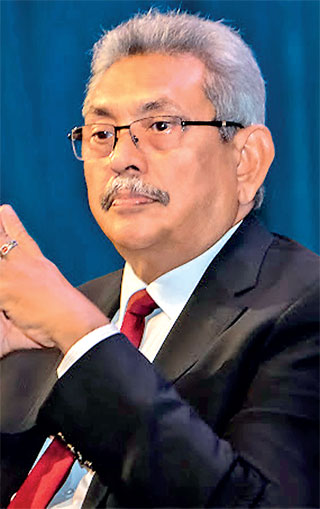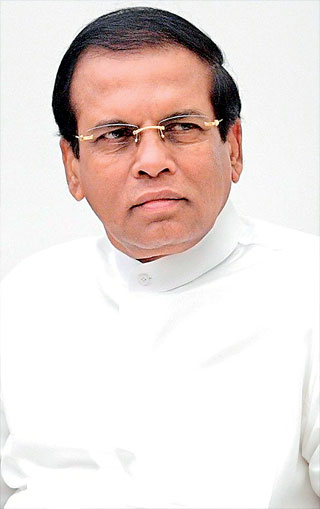Wednesday Feb 18, 2026
Wednesday Feb 18, 2026
Thursday, 30 September 2021 00:05 - - {{hitsCtrl.values.hits}}

In his UNGA address, President Gotabaya Rajapaksa boastfully revealed the roots of the growing agrarian crisis

Former President Maithripala Sirisena has called for immediate measures to reverse and resolve the agrarian crisis

Yohani de Silva has proved 5 important things; firstly, that good news and a feel-good factor are possible in bleak times
|
 Now we know who makes the decisions on manifestly non-military, public health matters:
Now we know who makes the decisions on manifestly non-military, public health matters:
“…The Vice-Chancellor of the University of Kelaniya, Senior Professor Nilanthi de Silva…said that although it was mentioned earlier that the Moderna vaccine would be available to students at the Army Hospital today and tomorrow, the Army had informed her last night (24 September) that the Moderna vaccine will not be given due to unavoidable reasons.” (Ada Derana)
So, is UN Human Rights High Commissioner Michelle Bachelet wrong about militarisation?
Compost and fan
Not since 19th century British colonial occupation has there been such an anti-peasant offensive as is currently underway:
(1) Damage to crops and rural livelihoods by the ban on chemical fertiliser-weedicides-pesticides.
(2) Damage to dwellings and crops by marauding elephants due to the removal of elephant-deterring electrified fences for corporate land-grabs and leisure walkways.
(3) Impediments to irrigation due to diversion of water and tampering with reservoirs.
Former President Maithripala Sirisena warned on Sirasa’s Pathikada in an interview given to veteran television journalist Asoka Dias, that a catastrophe loomed and pleaded that immediate, effective, large-scale measures be taken to reverse and resolve the multifaceted agrarian crisis. He also lamented that in the wake of the probable collapse of the harvest, there would be food shortages and a spiral of food prices. Ex-President Sirisena is a former Minister of Agriculture and the Mahaweli for pretty much 17 years, and a man from a peasant background.
In his UNGA address President Gotabaya Rajapaksa boastfully revealed the roots of the growing agrarian crisis:
“…My Government completely banned the use of chemical fertilisers, pesticides, and weedicides earlier this year. Production and adoption of organic fertiliser, as well as investments into organic agriculture, are being incentivised.”
Shouldn’t the measures “being incentivised” have been taken at least a year BEFORE, and not after “completely banning”? Isn’t it a classic illustration of placing the cart before the horse, or in this case, the bull or cow?
President GR repeated his revelation, addressing the UN Food Security Summit:
“…With regard to Sri Lanka’s organic fertiliser revolution, President Rajapaksa said, the current Government took the bold step to restrict imports of chemical fertilisers, pesticides, and weedicides earlier this year as the country’s most recent past saw increasing use of these harmful substances that led to adverse health and environmental impacts. However, changing the mindset of farmers long accustomed to using chemical fertiliser and the production of sufficient quantity of organic fertiliser domestically have proven challenging, he added.” (adaderana.lk)
Surely the capacity for “production of sufficient quantity of organic fertiliser domestically” should have been ensured before embarking on “the bold step to restrict imports of chemical fertilisers, pesticides, and weedicides”? Why shut something down before you have ensured adequate supply for existing demand?
Any price spiral by rice-millers and wholesale/retail merchants could be pre-empted by a rich harvest and surplus of local food supply, but that has been foreclosed by President GR’s pre-emptive strike on the harvest: the shock ban of fertiliser-weedicide-pesticide imports.
Then there’s the timing. Why would you compound the problems of the people as well as your own, by creating a crisis while you are grappling with COVID-19 and its economic consequences?
Now that President Gotabaya Rajapaksa engaged in full-disclosure to global audiences at the highest level, everybody will know at whose desk the buck should stop when the compost hits the fan.
Home-grown
Speaking on accountability, President GR’s UNGA address made this sweeping generalisation:
“…history has shown that lasting results can only be achieved through home-grown institutions reflecting the aspirations of the people. Sri Lanka’s Parliament, Judiciary and its range of independent statutory bodies should have unrestricted scope to exercise their functions and responsibilities.”
That’s ironic since “Sri Lanka’s Parliament, Judiciary and its range of independent statutory bodies” which he says “should have unrestricted scope to exercise their functions and responsibilities”, manifestly do not. That’s because such scope has been severely constricted by the anaconda-like 20th Amendment which he pushed through, overriding even the modest modifications suggested by his brother Mahinda’s Prime Ministerial committee.
Earlier in his UNGA speech, President GR had said:
“Sri Lanka has enjoyed universal adult franchise since pre-Independence. The democratic tradition is an integral part of our way of life.”
Now, “universal adult franchise” was hardly “home-grown” but has had “lasting results” because it has taken root. The same goes for Sri Lanka’s Presidency, Parliament, competitive political party system and laws and legal institutions. Our most durable institutions have not been “home-grown” but have taken deep root. In any case, not everything grows at home (as any agro-scientist would tell the President, should he ask them).
“Home grown” is not part of UN discourse and is incongruous in any UN forum, because the UN is based precisely on the notion of ‘universality’ as in the ‘Universal Declaration of Human Rights’. It is only if you base yourself upon universality and universal standards that you can accuse others of hypocrisy and “double standards”.
Any international commitment by a government imperatively requires a national consensus and domestic legitimacy. Resolution 30/1 of 2015, co-sponsored by GoSL at the insistence of Prime Minister Wickremesinghe, manifestly failed to enjoy. But “national consensus” and “domestic legitimacy” are by no means conceptually coterminous with “home grown”, any more than agrarian productivity is with organic fertiliser.
Germany’s SPD, Sri Lanka’s SJB
The (slender) victory of the centre-left Social Democratic Party (SPD) of Olaf Scholtz in Germany, despite the iconic Angela Merkel on behalf of her successor as CDU leader, taken together with the surge for the Green Party led by a young woman, underscores the point made repeatedly by this columnist. The world is voting for change and that change is not in favour of (a) rightwing conservative free-market economics (b) ultranationalist authoritarianism or (c) the Chinese governance model.
Living in the oldest democracy in the Afro-Asian continents, we Sri Lankans should stand with Prime Minister Modi’s ringing UNGA declaration that “Democracy Can!” It was a clear ideological pushback against the Anti-Democracy Equation (to adapt Zack Synder and Jim Lee); the propagation of the Chinese governance system as a systemically superior alternative to democracy even outside of China.
However, given Sri Lanka’s social ethos, we must also recognise and embrace the paradigm shift within democracy. From the defeat of Trump and the victory of Biden-Harris, through the re-election of Mexico’s Lopez Obrador, Jacinda Ardern and Justin Trudeau, and now the win by Germany’s SPD and the surge by the Greens, the global zeitgeist is clear. The shift is to the moderate centre-left, towards progressive New Deal liberalism/social democracy/left populism.
Where and what is Sri Lanka’s Centre-Left? The global trend that culminated with Gotabaya Rajapaksa’s 2019 win has ebbed since Trump’s defeat and is being superseded globally. Those in the Opposition who share Ranilist UNP ideology remain tied to the rightwing economics of the Conservatives and US Republicans. The JVP-NPP regards itself as the Marxist Left. That leaves a clear space for the new party and mainline Opposition, the SJB, as the Social Democrat centrist alternative and prospective partner of the US Democrats, just as Ranil’s UNP was of the US Republicans, UK Conservatives and Germany’s Christian Democrats. This should come naturally to a party led by Sajith Premadasa:
“…As a deputy minister in the Dudley Senanayake administration of 1965-’70, Premadasa had been the second Lankan politician ever, to reach out to Western Social Democracy – the first being his erstwhile leader A. E. Goonesinghe who, as Prof. K. M. de Silva documents, sought to link up with the British Labour Party. Premadasa returned from a visit to West Germany and close interaction with Willy Brandt. He sought the assistance specifically of the Friedrich Ebert Stiftung (FES), the foundation officially affiliated with the German Social Democratic Party (SPD), to set up the Sri Lanka Foundation Institute (SLFI) for the task of labour education. The SLFP-led coalition, in Opposition and later in office, denounced Premadasa as ‘backed by the West Germans’…” (Premadasa: ‘Swadeshaya’ & Social Democracy – Colombo Telegraph – https://www.colombotelegraph.com/index.php/premadasa-swadeshaya-social-democracy/)
When the results were announced, wild cheers broke out at the SPD’s Berlin Headquarters, Willy Brandt House. When Olof Schultz announced his intention to form a governing coalition, he stood next to a statue of Willy Brandt.
Earlier this year, the builder of Sri Lanka’s open economy of 1977, Ronnie de Mel, insisted to the Leader of the Opposition and his delegation that paid a call on him on his birthday that what Sri Lanka will need to be saved from the economic catastrophe we are heading to under the incumbent regime, is the formula of the Open Economy+ (Buddhistic) ‘socialist values’. That sounds like South Asian social democracy to me.
|
Quad Sphere
On the sidelines of the UNGA sessions President Gotabaya Rajapaksa had very few bilateral meetings—a key indicator of a country’s diplomatic standing. There was no meeting with Prime Minister Modi.
The newly-formed trilateral military alliance AUKUS (Australia-UK-US), sharpens the edge of western power-projection in the South China Sea/East Asia. It comes at a high price, with the alienation of France and raised eyebrows in Europe at the openly Anglophone angle. If Europe goes semi-Gaullist with a nudge from Macron and asserts strategic autonomy collectively, it will enhance the tendency to multipolarity in world affairs, which is more beneficial to Sri Lanka than is bipolarity (USA/China).
The pressing question for Sri Lanka though, is that as the great power strategic confrontation sharpens and hard power is firmed up in the Asia-Pacific part of the Indo-Pacific, can the ‘Indo’ zone be far behind as a theatre of contestation?
Sri Lanka’s discourse at the UNHRC included an explicit, robust defence of China’s policy in Hong Kong and Xinjiang. While we have consistently upheld the One-China policy and must certainly oppose interference in China’s internal affairs, there was no call to go beyond reciprocating China’s principled generalised support of Sri Lanka—which does not specify discrete local issues—to one which specifically named China’s contentious local issues.
The respected Indian newspaper The Statesman recently carried a story that China’s projects on the islands off Jaffna would pose a threat to India by bringing expanding the Chinese footprint in Lanka so that it has a toehold in the Palk Straits. The newspaper called on India’s Minister of Defence to be mindful.
The summit meeting in the White House of the Quad (during the UNGA session) and the further augmentation of the partnership between the world’s oldest democracy, America, and the world’s largest democracy, India, makes clearer than ever the military balance in the Indian Ocean and Sri Lanka’s strategic setting. Sri Lanka falls within the parallelogram of forces constituted by the Quad, reinforced by AUKUS.
SLFP scenario
The coalition partners of the Pohottuwa have only two choices: sink with the ship or jump ship.
In 1976-1977, four SLFP MPs, TB Subasinghe, Nanda Ellawela, AM Jinadasa, and Tennyson Edirisooriya split-off and formed the People’s Democratic Party (PDP). Had it done so when mass hardship had bitten hard in 1973, and joined/been joined by the Left, the UNP wouldn’t have enjoyed the monopoly of the Opposition.
The Communist party (CPSL) split in 1972 with the principled faction led by Dr. S.A. Wickremasingha and Sarath Muttetuwegama (supported by the newspaper ‘Aththa’), going into Opposition. Had it remained there instead of being reunified on Moscow’s instructions by the party’s Gen-Sec K.P. Silva, the country would have had a leftwing third force.
Had Vasudeva Nanayakkara and the LSSP’s radicals (‘Vama Samasamaja’) split in 1972 and joined the CPSL during its spell in the Opposition, a viable Left Opposition platform (led by Sarath and Vasu) would have been created.
Yohani and Sumudu
Twenty-something Yohani de Silva proved five important things. Firstly, that good news and a feel-good factor are possible in bad, bleak times.
Secondly, that ‘Yes, You Can!’ You can be successful, not by manipulating the stock-market and ripping off the forests, but by bringing something that’s pleasing and positive into people’s lives.
Thirdly, you can be young and First World-educated, but you don’t have to escape Sri Lanka to produce something worthwhile and world-beating. If you are good enough, you can contribute, achieve and make a breakthrough, even during COVID-19, right here.
Fourthly, Sri Lanka naturally belongs to South Asia; our natural identity is also South Asian, not exclusively Sri Lankan. We can succeed in South Asia and through South Asia, in the world. That’s our market, it is gigantic in and of itself, and can be the platform for the global market.
Fifthly, Sri Lankans are at their best and most successful when multiethnic, multicultural, multilingual.
I had been a fan of Yohani’s earlier work, angst-tinged urban Sinhala rap. Having watched as a kid, Duke Ellington live at the Colombo Race Course, hit my teens listening to Grace Slick (White Rabbit, from Woodstock 1969, is the theme song for Matrix 4: Resurrection), Laura Nyro and Nina Simone, and wound up one of the Ambassador/Permanent Delegates who together with Herbie Hancock, founded and launched International Jazz Day at the UNESCO, Paris in 2011, my favourite singer of Sri Lankan origin currently is Sumudu Jayatilaka who performs with Van Morrison, while her album of original songs was produced by Sting’s, James Taylor’s and James Morrison’s producer, Kipper.
The Sri Lankan in me was very proud when I discovered the video of the Van Morrison Concert at the Royal Park in Soestdijk, The Netherlands, 2017. Van the Man is singing ‘Gloria,’ then walks off the stage as he tends to, letting his band go into a jam session; the lead guitarist signals to the drummer who signals Sumudu to take over the vocals; a surprised Sumudu makes a “me?” gesture and in a nanosecond, swings superbly into the song, triggering a rousing ovation from the crowd in the park as she ends. (Van Morrison Gloria Soestdijk The Netherlands 8 July 2017 – https://www.youtube.com/watch?v=QzlROKPVKsM) I hope she makes it to Montreux. (Sumudu - Tennessee Waltz – https://www.youtube.com/watch?v=MaENIXPiUYU)
In case you’re wondering, despite the shared surname (spelt differently) Sumudu Jayatilaka is no relative of this writer, though Sunil de Silva, the former percussionist of world-famous jazz trumpeter James Morrison (who opened International Jazz Day at the Obama White House), is my first cousin on the maternal Moratuwa side. (Watch James Morrison Trumpet – Still Dangerous – https://www.youtube.com/watch?v=9rf0tJmIQiA)
The great tradition of Ceylonese chanteuses goes back to Yolande Bavan who sang at the Newport Jazz Festival 1963, where Duke Ellington, John Coltrane, and Nina Simone performed. On the day, 5 July 1963 that Lambert, Hendricks and Bavan performed, so did Dizzy Gillespie.
Yohani’s ‘Manike’ had a pop vibe that didn’t instantly resonate with my musical sensibility, but grows on you and turns addictive. Italian street saxophonist Daniele Vitale’s version, as that by the Ukrainian violinist-busker in Santa Monica have taken ‘Menike’ beyond the South Asian musical space. Yohani singing ‘Manike Mage Hithe’ backed by Vitale’s Grover Washington Jr style saxophone could be the breakthrough to the jazz/world music genre.